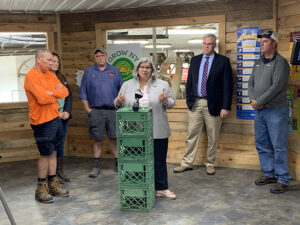By Zander Frost, Chronicle Staff Writer

The New York State Farm Laborer Wage Board, on a 2-1 vote, last Friday afternoon approved a resolution to lower the threshold for overtime pay from 60 to 40 hours in phases over the next 10 years.
Proponents say the move will give farm laborers a fair wage. Local dairy farmers told The Chronicle in October that it will “kill” them financially and drive laborers to leave New York.
They said dairy farmers don’t set their own prices at which they sell milk to cooperatives and say they cannot raise them to compensate for increased labor expenses requiring by having to pay time-a-half overtime.
They say that this policy would force them to limit the number of hours laborers can work and that workers will seek employment in other states with no overtime cap to maximize their earnings.
New York Farm Bureau President David Fisher, who is on the Labor Wage Board and was the lone vote against the resolution, asked Gov. Hochul to find an alternative to the board’s decision.
“It will be extremely difficult for farmers and farmworkers to absorb and will change the face of New York agriculture.” Mr. Fisher’s release said, “About 70% of the testimony was in favor of keeping the overtime threshold at 60. Many farmers and farmworkers testified that anything lower will hurt farmworkers.”
“It will mean fewer hours, less income and force those wanting to work more to find a second job or leave New York State for employment,” it added.
“In the end, the decision was made with little deliberation or reflection of the testimony. I would have hoped my fellow board members would have considered more of the impacts that this will have on agriculture,” he said in a press release.
The overtime decision drew bipartisan criticism from local elected officials.
Republican State Senator Dan Stec,, “Despite widespread opposition from farmers across the state, the unelected bureaucrats on the board have moved forward with a new mandate that could jeopardize the future of agriculture in our communities and state.
“At a time when residents are leaving our state in droves and opportunities are dwindling, now is certainly not the time to move forward with an unpopular mandate that makes it harder for farmers to hire workers,” he added.
Democratic Assemblywoman Carrie Woerner said, “The recent study by Cornell University concluded that lowering the overtime threshold on farms from 60 hours to 40 would be economically unsustainable. And 70 percent of all of the public comments received by the wage board, from farmworkers as well as farmers, called on the wage board to leave the overtime threshold at 60 hours.”
“Local agriculture is critical to ensuring that New York has a food supply chain…When we have to depend on a national and international supply chain to provide for basic nutrition, we have seen what happens when it is disrupted: empty shelves and higher prices,” she added.
Republican Assemblyman Matt Simpson said, “We should not allow two unelected Albany bureaucrats to determine the future of the New York state family farm. If adopted, the lowering of this threshold would be a death knell for our farmers.” He said, “Farmers have been nothing short of heroic over the last couple years dealing with the pandemic, inflation, supply chain issues and burdensome regulations coming out of Albany.
“I urge Gov. Hochul and Labor Commissioner Reardon to NOT adhere to the recommendation from the Farm Laborer Wage Board.
Republican Congresswoman Elise Stefanik said, “This decision by the Farm Laborers Wage Board proves once again how out-of-touch Albany Democrats are with our agricultural community. By lowering the overtime threshold, they are jeopardizing the future of New York’s agriculture industry and putting thousands of farm laborers out of work, increasing the unemployment rate in New York and across the nation.”
Albany public radio station WAMC reported that the Farm Bureau is asking Governor Kathy Hochul to “rethink” the decision, and override the vote.
WAMC said supporters, including labor unions, argue that farm laborers are the only category of workers who have not fallen under the state’s labor laws requiring overtime pay after 40 hours of work per week.
“Unless Hochul acts to change it,” reported WAMC, “the phase into a 40-hour work week for farm laborers begins in January of 2024, with the institution of a 56-hour work week.”
It noted, “Hochul, in her state budget plan, has proposed a tax credit to help offset the overtime pay required under the change,” and that Farm Bureau president Mr. Fisher said it “looks good on paper,” but he will need to see details.
He said farmers are concerned that they would have to pay the workers the overtime first, and then wait until the tax returns are processed the following year to apply the tax credit, and that could create cash flow problems, WAMC said.
Mr. Williams was quoted: “If we could think of some way to make that an easier process, a quicker process, then that is something definitely worthy of exploring.”
WAMC said Hochul spokesman Jim Urso released a statement saying, “Governor Hochul is committed to making New York the most business-friendly and worker-friendly state in the nation and has proposed major investments in her Executive Budget to boost the State’s agricultural industry — including a significant tax credit package that would support both farmers and farm workers.
“We are confident that [New York State Department of Labor] Commissioner [Roberta] Reardon will review the Board’s recommendations closely and ensure that the final decision puts the State on a path to improve the lives of farm workers while protecting New York’s vital farm industry.”
Copyright © 2022 Lone Oak Publishing Co., Inc. All Rights Reserved
 Glens Falls Chronicle Serving the Glens Falls/Lake George region; Warren, Washington and northern Saratoga counties since 1980
Glens Falls Chronicle Serving the Glens Falls/Lake George region; Warren, Washington and northern Saratoga counties since 1980


